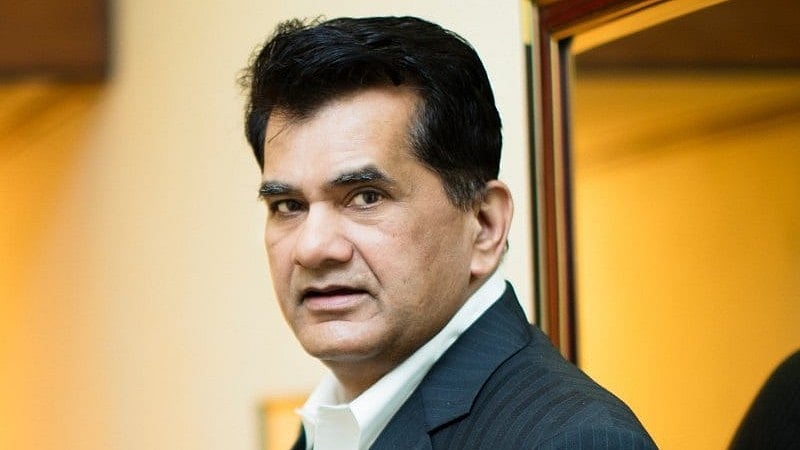
Credit: Special Arrangement
The G20 Summit, held in New Delhi in September 2023, was one of the largest international gatherings in India in recent decades. A key success of the event was the consensus reached on a joint declaration, despite the world being deeply divided over the Russia-Ukraine war. The New Delhi Leaders’ Declaration was released on the first day of the two-day event. G20 Sherpa Amitabh Kant, who led India’s negotiations, spoke to DH’s Gyanendra Keshri about the behind-the-scenes events. He discussed how India employed various tactics to reach a consensus on the joint declaration and Prime Minister Narendra Modi’s role in the negotiations. Kant’s new book, How India Scaled Mt G20: The Inside Story of the G20 Presidency, provides insight into the closed-door meetings and diplomatic engagements during the Summit. Excerpts:
In your book, you outline the conflicts between the US and China on key issues during the G20 negotiations. Can you elaborate on how the consensus on the joint declaration was built and what role Prime Minister Narendra Modi played in it?
The PM was very clear, and at one stage he told me that the G20 is the premier body. It is the responsibility of every country to build consensus. And if they don’t agree, we should clearly tell them that India wants consensus; if they don’t want to concede even in such difficult times and don’t want to bring consensus, we would rather work with BRICS; we would rather work with IBSA (India, Brazil, and South Africa) than work with G20. I told them, and that put a lot of pressure on them. We adopted many tactics: cajole, plead, and threaten. It worked, and we were able to bring consensus on all key issues during India’s presidency.
Was there nervousness and anxiety in the Indian team about the success of the summit?
We were not anxious. The PM was closely monitoring the development. We were sending a situation report every two hours. It helped us remain focused on the outcomes. He allowed us to take risks. He delegated a lot to me to negotiate, and I think his ability to delegate helped us.
What were the key points of contention in the joint declaration?
The main challenges were on two key issues: climate and the challenge of bringing a consensus on the Russia-Ukraine para. As regards climate, we had to bring ambition from the viewpoint of emerging markets for more finance. So we moved from billions to trillions (in commitment to address climate change). All ministerial meetings had failed because of the Russia-Ukraine crisis. Even the United Nations has not been able to agree on a text on Russia-Ukraine. It took us 300 hours of negotiation to agree on one para on the Russia-Ukraine crisis. There were 250 bilaterals, and 16 drafts had failed. A consensus was built on the 17th draft, which was adopted as the New Delhi G20 Leaders’ Declaration.
How was China’s approach?
China was opposed to many things that India was doing. They were opposed to Vasudhaiva Kutumbakam, LiFE (Lifestyle for Environment), women-led development, the promotion of millets, and many other things. We had a major challenge when China objected to the United States hosting the G20 in 2026. When asked why, they said it was because the US does not issue visas to Chinese, particularly people from Hong Kong. So we negotiated for three hours towards the end. After three and a half hours, we could hammer out a settlement. China wanted a written legal guarantee from the US on visa issues. The US didn’t agree. Instead of a written legal guarantee, we could get them a letter saying that the US will ensure that all visas are issued.
Two high-profile leaders—the presidents of China and Russia—didn’t participate. Do you consider it a setback?
To my mind it was a blessing in disguise that the Chinese president did not come. He had gone to Bali, and his meeting with Biden actually overwhelmed the Indonesian G20 presidency. So in our case the focus remained on India’s G20. The focus remained on India rather than China-US. Had Russia’s Putin come, the G20 would have been completely overshadowed, and it would have led to a lot of challenges for India. Opposition from G7 would have been huge, and the discussions would have gone haywire.
How was the US’ approach?
Americans were very supportive of India during G20. They wanted India to succeed. They assisted, supported, and collaborated with India. I must say, because of that, India fully succeeded.
Will India play a similar role when the US hosts the G20 meeting in 2026?
Of course, we will continue to play a positive, constructive role.
How do you see the progress on the New Delhi G20 Leaders’ Declaration?
The progress is very good. Many of the things have been taken forward during the Brazilian presidency and now during the South African presidency. A lot of headway has been made. Many of the things that India said during its New Delhi Declaration have become a part of international negotiation and diplomacy.